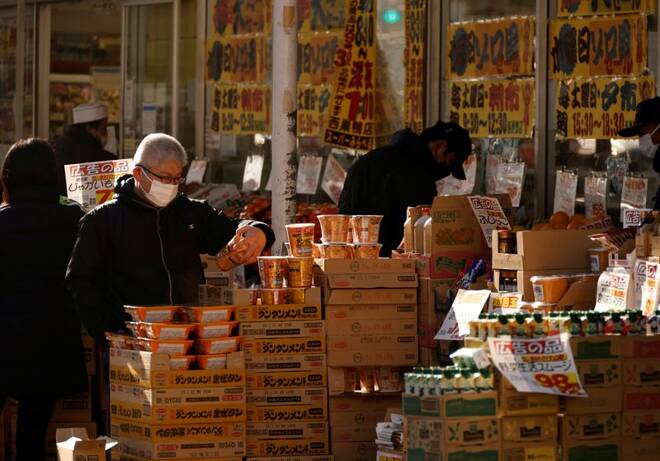Advertisement
Advertisement
Consumer inflation in Japan’s capital hits near 42-year high, keeps BOJ under pressure
By:
By Takahiko Wada and Leika Kihara TOKYO (Reuters) - Core consumer prices in Japan's capital, a leading indicator of nationwide trends, rose 4.3% in January from a year earlier, government data showed on Friday, exceeding the central bank's 2% target for an eighth straight month.
By Takahiko Wada and Leika Kihara
TOKYO (Reuters) – Core consumer prices in Japan’s capital, a leading indicator of nationwide trends, rose 4.3% in January from a year earlier, marking the fastest annual gain in nearly 42 years and keeping the central bank under pressure to phase out economic stimulus.
While the government’s energy subsidies starting next month will likely moderate price gains from February, the data heightens the chance that inflation will stay well above the Bank of Japan’s 2% target in coming months as companies continue to steadily pass on higher costs to households.
The rise in the Tokyo core consumer price index (CPI), which excludes fresh food but includes fuel, exceeded a median market forecast for a 4.2% gain and marked the fastest year-on-year increase since May 1981.
It followed a 3.9% rise in December and stayed above the central bank’s 2% target for an eighth straight month, data showed on Friday.
The yen and the yield on the 10-year Japanese government bond (JGB) rose after the data release, reflecting market expectations that rising inflation could prod the BOJ to soon dial back stimulus.
“These readings point squarely at a further, large increase in inflation at the national level this month,” said Darren Tay, Japan economist at Capital Economics.
“But we expect that to have been the peak. Government measures to lower energy bills will kick in next month and bring inflation down by about 1% point,” he said.

An index for Tokyo excluding both fuel and fresh food costs, which is closely watched by the BOJ as a gauge of price pressure driven by domestic demand, was 3.0% higher in January than a year earlier, picking up from December’s 2.7% annual gain.
The data came in the wake of the International Monetary Fund’s proposal on Thursday that the BOJ allow government bond yields to rise more flexibly to lay the groundwork for a smooth exit from ultra-loose monetary policy.
It also comes ahead of the BOJ’s crucial leadership transition, which some analysts say could install a new governor more keen to unwind its radical monetary stimulus than incumbent Haruhiko Kuroda is.
The BOJ kept monetary policy ultra-loose this month but raised its inflation forecasts in fresh quarterly projections, as companies continued to pass on higher raw material costs to households.
Kuroda, whose term will end in April, has stressed the need to keep monetary policy ultra-loose until wages rise more, changing the recent cost-push inflation into inflation driven by robust domestic demand.
(Reporting by Takahiko Wada and Leika Kihara; Editing by Bradley Perrett)
About the Author
Reuterscontributor
Reuters, the news and media division of Thomson Reuters, is the world’s largest international multimedia news provider reaching more than one billion people every day. Reuters provides trusted business, financial, national, and international news to professionals via Thomson Reuters desktops, the world's media organizations, and directly to consumers at Reuters.com and via Reuters TV. Learn more about Thomson Reuters products:
Did you find this article useful?
Latest news and analysis
Advertisement
